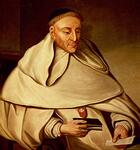
Tirso de Molina (pseudonym of Friar Gabriel Téllez; Madrid, March 24, 1579-Almazán, around February 20, 1648) was a Spanish Mercedarian religious who stood out as a playwright, poet and narrator of the Baroque period.
Tirso de Molina stands out above all as a dramatic author. His plays mainly include the comedy of intrigue, such as Don Gil de las calzas verdes, and hagiographic works such as the trilogy of La Santa Juana or La dama del olivar. He has traditionally been credited with the creation of the myth of Don Juan in El burlador de Sevilla, whose first version could be from 1617, with the work Tan largo me lo fiais, published in the 17th century in the name of Calderón and which part of the critics attribute to Andrés de Claramonte (not so another sector of critics, who consider it a version related to a common archetype written by Tirso between 1612 and 1625); In the aforementioned work, Don Juan, a Sevillian nobleman, upsets the social order by dishonouring all the women who come before him and is finally punished by the funerary statue of one of his victims, the father of one of the ladies he has deceived, who kills him and drags him to hell. The authorship of El condenado por desconfiado, a comedy of divine bandits, is also under discussion. Tirso was the first author to give psychological depth to the female characters, who became the protagonists of his literary works.




